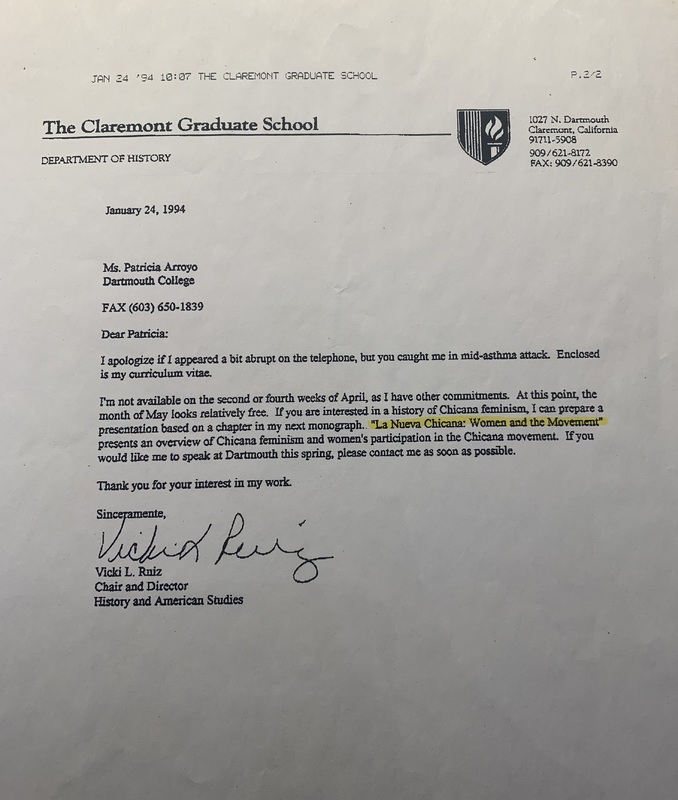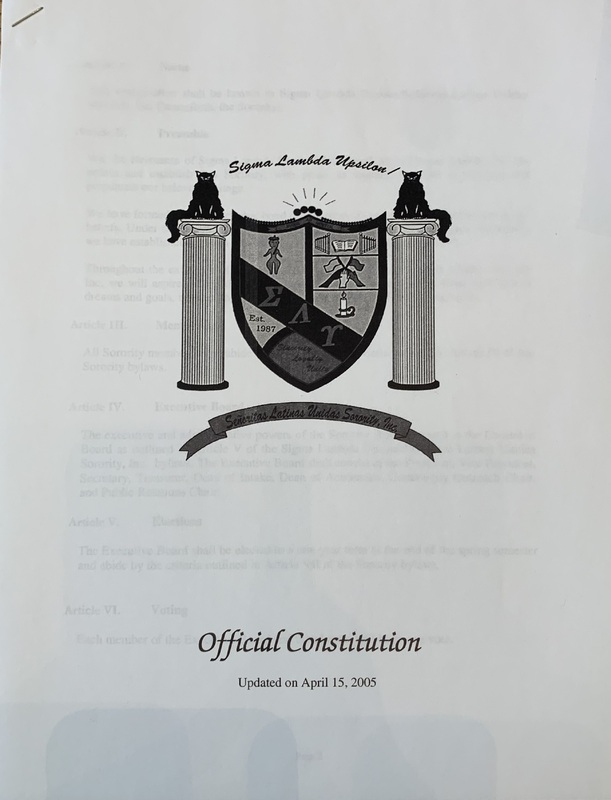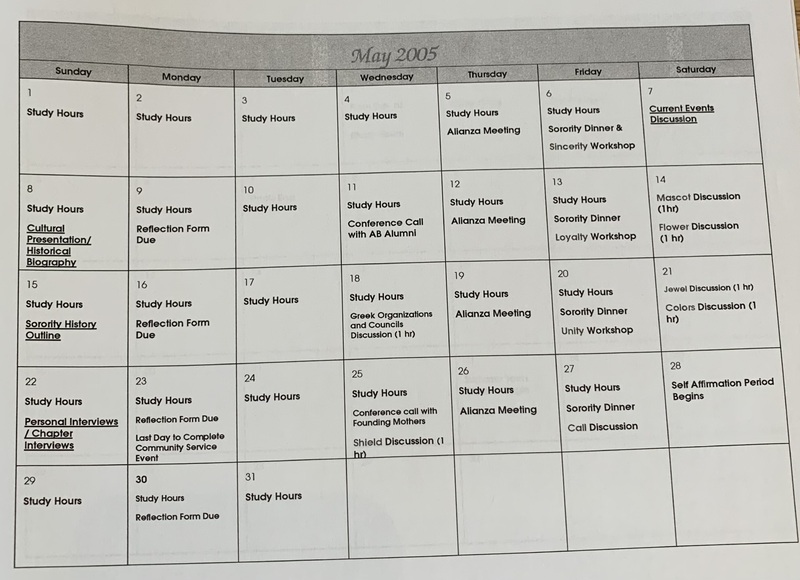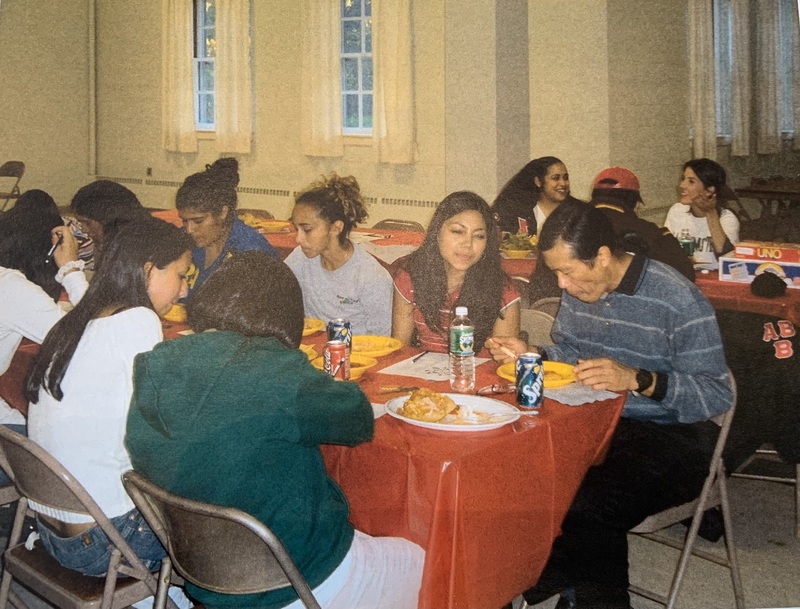The Latina Experience at Dartmouth
Introduction
In this exhibit we will explore the experience of Latina students at Dartmouth, whose unique status as both women and members of a cultural minority result in a very different experience from the majority of Dartmouth students.
There is a surprising lack of resources in Rauner related to the Latina experience at Dartmouth. Though I did not complete an exhaustive search of the archives, I did look through boxes and folders that were most likely to supply some information and was left mostly emptyhanded. I found a box about women and gender studies with folders relating to diversity, assuming that would at least give me some background on female minorities, even if it wasn't specfic to Latinas. However, all I could find was chain emails that went around the Dartmouth listserve that were derogatory to women and homosexual men. I thought again when I had found a box about diversity at Dartmouth that I would get some information on the experience of minority students. The box, however, just held minutes from faculty meetings in which they discussed the importance of diversity.
The lack of information does imply what life may have been like for these students at Dartmouth - they would have felt underserved, underrecognized, and even silenced by the community. In the late 1970s, Dartmouth had far lower rates of Latina/o admissions than did other comparable schools. This was likely because of the fact that the admissions office did not actively recruit Latinas/os combined with the fact that there were little to no Latina/o resources at Dartmouth.
Over the next few years, as more and more Latinas/os came to Dartmouth, there became a need for more programming and support for these students. I was able to find some information about two of the most prevalent organizations for Latina women - La Alianza Latina and Sigma Lambda Upsilon, a Latina sorority. Though information wasn't plentiful, it was enough to get an idea of what the organizations did, how they were created and run, and what value they provided to the Dartmouth community, specifically Latinas.
Clubs and Organizations
Clubs and organizations on a college campus allow individuals with similar interests and passions to come together, exchange ideas, and meet new people. In the case of cultural organizations like La Alianza Latina, these individuals can come together with their shared experiences and relate to each other in ways they are not able to elsewhere. Organizations such as these build stronger communities and create support networks for minority students.
La Alianza Latina
In 1985, La Alianza Latina (LAL), a student run organization created as a support network for US Latino students, was founded. Their 1992 Constitution stated that they were committed "in attempting to help solve any education, political, and social problems that US Latino students may encounter."
One of LAL's biggest roles in the Dartmouth community was bringing Latina/o speakers from around the community and the country to speak on Latina/o issues. One letter I found, pictured right, is from Vicki Ruiz, the Chair and Director of the Department of History at Claremont Graduate School. She offered to come to Dartmouth to speak about the history of Chicana Feminism to the community, at the request of LAL. The focus of looking for a Latina woman to speak about Latina-specific issues is clear, and suggestive of a particular dearth of support in that field from the Dartmouth administration.
In 2015, Vicki Ruiz was awarded the National Humanities Medal by President Obama for her work in labor empowerment and Mexican-American women's studies. One of her works, Latina Lives, Latina Narratives: Influential Essays, focuses in particular on the role of women in Latin society. She is well versed in feminist history, theory, and methodology, and is known for her deep insights and reflections in the subject.
Chicana Feminists like Ruiz argue that Latina women are in "double jeopardy", as they are discriminated against both for their gender and their ethnicity. This would not have been any different at Dartmouth, and perhaps would have been even more signficant due to the inherent nature of college-aged people, especially at a school like Dartmouth, known for its wild parties and unfortunate history of sexism and racism.
Sigma Lambda Upsilon
The Sigma Lambda Upsilon (SLU) sorority petitioned for colony status at Dartmouth for conducting membership intake activities in 2003. When a Greek organiztion has colony status, it typically means it is extant only on a probationary period and is waiting for official recognition from their national chapter. As part of their application, they included a letter of petition from interested students, as well as a Constitution (2005 version pictured left), risk management policy, and letters from the National Executive Board. The sorority was created to, as stated in the Constitution, "preserve and perpetuate" the sisters' "beloved heritage."
Though in its early days it only had four members and no alumni network, the sorority was able to host a plethora of events, often joint with LAL. A typical month's calendar, pictured right, included group study hours, cultural presentations, reflections, and sorority dinners. These events gave the opportunity for much needed inclusivity and community for Latinas at Dartmouth.
Though a few of the events were for sorority members only, many were open to the Dartmouth or greater Upper Valley community as well. One secondary source I found explains how people make connections to their community through personal stories - especially talking to older members in the community with similar backgrounds, who can give advice and guidance. This helps explain why SLU was so important to Latina students at Dartmouth, members or otherwise. Having this resource made students feel more recognized and supported than the Dartmouth administration provided alone.
One image I found in Rauner, pictured left, was from a community dinner during the 2004-2005 academic year. This dinner seemed to be held at a gymnasium or other community space in the Upper Valley and catered by a local Mexican restaurant. Since there were only four members of the sorority at this time, and there seem to be more than that number of college-aged Latina women, it is clear that this event was open to all those in the Upper Valley community. This will have helped Dartmouth Latinas meet others in the extended community, and hear their stories and relate with shared experiences.
Although this event was open to the community, SLU also often held "Mujeres Dinners", where Dartmouth Latinas could discuss their experiences with faculty and other Latina role models. Sometimes the discussions were focused - some were specific to sex, some to body image and identity, etc. - whereas others were more general and casual gatherings, with no set topic. This was a particularly important find, as it suggested that there was something missing from the discussions with male speakers. There are certain issues that Latina women face that are unique from those faced by both women and those faced by Latinos, and these dinners provided a way for younger students to hear from women in the community with shared experiences who could give them better advice.
Coming Together
Taking all of this information together, we can see that the Latina experience at Dartmouth was a complicated one - it is hard to get exact details with the available resources, but there was enough to draw some conclusions.
The lack of resources shows how Latinas were underrepresented, and the lack of programming from the Dartmouth administration shows how they were overlooked. However, the creation of these student organizations shows how important it was to Dartmouth Latinas that they have a community where they can support each other and honor their heritage. The Latina experience at Dartmouth has changed over the years, in large part because of these organizations, created for Latinas by Latinas, and though it has changed for the better, it is important to realize that the Latina experience is still very different from both the Latino or female experience. These organizations, and others like them, must therefore be supported by the Dartmouth community, as they are incredibly important for maintaining student wellbeing and diversity - both of which benefit everyone at Dartmouth.




